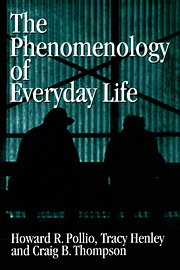Book contents
- Frontmatter
- Contents
- Preface
- PART I EXISTENTIAL PHENOMENOLOGY AND THE SCIENCE OF PSYCHOLOGY
- PART II GROUNDING THE WORLD OF EVERYDAY LIFE
- PART III SELECTED TOPICS FROM EVERYDAY LIFE
- PART IV THE PHENOMENOLOGY OF EVERYDAY LIFE
- 11 Toward an Empirical Existential-Phenomenological Psychology
- References
- Name Index
- Subject Index
11 - Toward an Empirical Existential-Phenomenological Psychology
Published online by Cambridge University Press: 04 August 2010
- Frontmatter
- Contents
- Preface
- PART I EXISTENTIAL PHENOMENOLOGY AND THE SCIENCE OF PSYCHOLOGY
- PART II GROUNDING THE WORLD OF EVERYDAY LIFE
- PART III SELECTED TOPICS FROM EVERYDAY LIFE
- PART IV THE PHENOMENOLOGY OF EVERYDAY LIFE
- 11 Toward an Empirical Existential-Phenomenological Psychology
- References
- Name Index
- Subject Index
Summary
Could there possibly be such a thing as an empirical existential-phenomenological psychology? Aside from the articulatory problems such a linguistic mouthful might cause, this approach would also seem to require contemporary psychology to give up, or at least strongly modify, certain long-held beliefs and practices. For one, there is the issue of content: No longer could psychology be described as the disciplined study of behavior; it would now have to become the disciplined study of behavior and experience or, even more radically, experience and behavior. Second, there is the issue of method: No longer would a quantitative evaluation of disinterested observation in special situations be criterial; now a new and more qualitative emphasis would be placed on dialogue, narrative, and interpretation as these affect descriptions of the extralaboratory worlds of everyday life. Finally, there is the issue of biology: An existential-phenomenological psychology deriving from Merleau-Ponty would, of necessity, have to reconfigure the significance of biological fact and theory for psychology. As such, it would seem to call into question all contemporary attempts at what is usually termed reductionism.
Although it is possible to view each of these considerations as asking psychology to give up something it now holds dear, a more productive way of thinking about the relationship between existential phenomenology and contemporary psychology is in terms of a series of issues to be confronted rather than a set of injunctions to be followed. If such a turn is taken, four questions emerge of significance for any dialogue between contemporary psychology and existential phenomenology.
- Type
- Chapter
- Information
- The Phenomenology of Everyday LifeEmpirical Investigations of Human Experience, pp. 337 - 365Publisher: Cambridge University PressPrint publication year: 1997



